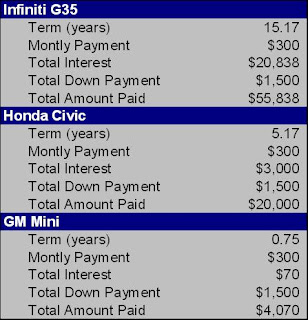This type of car would open the door to innumerable new drivers. Temporarily ignoring the increased congestion and adverse effects on the environment, the prospect of a new paradigm in car manufacturing is a relief.
Americans are particularly fond of their large, comfortable automobiles. Current pricing differentials on small to mid-size vehicles are not enough of an incentive to buy a smaller car. However, if the price tag dropped to $4,000 on a small vehicle, I predict many buyers will reevaluate how much space they really need. The price would create a breaking point to finally separate Americans from over sized and inefficient vehicles.
Another benefit of the $4,000 car option is greater flexibility for American consumers. The U.S. personal savings rate in November was negative 0.5%. With finances stretched to the limits, it is no wonder we are dealing with the sub-prime mortgage crisis and a looming recession. The sensitivity of American consumers is levered so tightly to home prices and interest rates, the rest of the economy falters soon after any housing disturbances.
Below are a few scenarios based on estimated car prices and basic assumptions for payment. Specifically:
- $300 Monthly Payment
- $1,500 Down Payment
My conclusion is the economy, the environment and our culture would be improved dramatically by shifting priorities away from ostentation to conservative and thrifty consumption.


